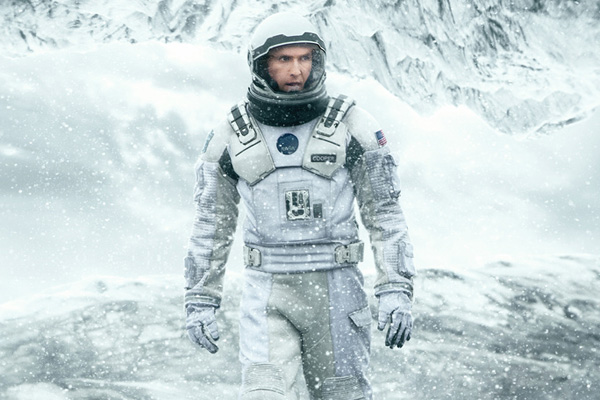Christopher Nolan's 'Interstellar' demands for a patient, open-minded and perceptive audience.
For this very reason, it is destined to divide. Missing are the exhilarating action set pieces that viewers have come to expect from the director. At its core, Nolan's three-hour epic is a high concept, science fiction love letter that mourns for mankind's pioneering past and embraces the transcendent power of love.
Set in the not-so-distant future, Earth's natural resources are scarce and overrun by a plague known as 'blight'. Mankind has lost the need for scientists and engineers. Inquisition and expedition are skills that we as a species can no longer afford to indulge. The vast majority of the human race have been reduced to the role of farmers, in an effort to prevent worldwide starvation. Cooper (Matthew McConaughey), a former NASA pilot, eyes set permanently towards the heavens, longs for something more than the fate that has mysteriously sentenced the Earth to extinction.
 "We're explorers, not caretakers."
"We're explorers, not caretakers."A series of odd and unexplainable occurrences involving Cooper's daughter Murphy and a 'ghost' that communicates through coded messages, leads Cooper to uncovering a secret NASA base and a last-ditch mission to save the earth. NASA's remaining scientists have discovered a wormhole, and on the other side, could be the salvation for mankind.
It's the sort of mind-bending ambitious filmmaking that the director has shown consistently throughout his filmography. But even by his own standards, Interstellar is without question Nolan's most ambitious (and sentimental) work yet. This film is no 'Dark Knight' or 'Inception'. It can be best described as the modern day equivalent to Stanley Kubrick's '2001: A Space Odyssey'. Both films aim to examine the existential mysteries of our universe and the role of humankind. Each film uses scientific experimentation and intergalactic exploration as the lens by which our existence is questioned. Though thematically and visually similar, what separates the work is how this inquisition is handled.
Kubrick's film was almost without dialogue for much of its runtime. It was a visual piece of cinema that allowed the audience to reach their own conclusions and understandings privately. Nolan's film is equally as beautiful on the eyes, but it relishes and embraces the critical scientific debate.
Viewers and critics may find the insistent exposition dumps taxing, while others may marvel at the intellectual theorising with wonderment. Nolan clearly indulges in the science and wants the audience to partake in the investigation. Going as far as hiring theoretical physicist Kip Thorne in an effort to add validity and plausibility to the discussion.
Underlining the audacious concepts and intellectualism is a powerful tale of a father's endless love for this children; more specifically his daughter Murph (Mackenzie Foy).
In agreeing to partake on this impossible mission across dimensions of space and time, Cooper leaves with the knowledge that his children will age and possibly die while he's away trying to save the world. The severe time dilation allows for Murphy to mature into adulthood (played by Jessica Chastain), while McConaughey's Cooper stays the same age.
 McConaughey's career transformation continues in full and impressive fashion here as Nolan's leading man. There's an endearing charisma to everything he does on screen. The sound design doesn't always help in understanding his southern drawl, but that doesn't stop from believing completely in Cooper's torment and regret that follows him throughout the universe.
McConaughey's career transformation continues in full and impressive fashion here as Nolan's leading man. There's an endearing charisma to everything he does on screen. The sound design doesn't always help in understanding his southern drawl, but that doesn't stop from believing completely in Cooper's torment and regret that follows him throughout the universe.The film swells with idealist sentimentality and it's not hard to envision Steven Speilberg directing this piece as he was originally intended to. Nolan (perhaps channeling his own inner-Speilberg) doesn't shy away from being unashamedly sentimental in his handling of the family drama. The bending of quantum physics, allows for some truly powerful dramatic moments. While the quantifying of love may be a step too far for some audiences (and scientists), the idea that love can drive, impassion and connect people throughout time and space is a beautiful concept. While the science obviously cannot be proven, the emotions do not lie.
'Interstellar' longly dreams of a time when humans could reach their vast potential and achieve miracles. It's an intelligent and moving piece of cinema that forces the audience to engage in something far greater than your average film. It's an emotionally-charged and richly rewarding experience for those who are open to the ideas of love and hope conquering the limitations of our own knowledge and understanding.
I implore audiences to open themselves up to the challenge.
4/5
– written by Shayne Travis Grieve

